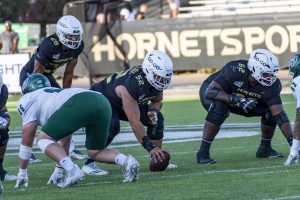Campaigning is a win, lose, win proposition
November 10, 2004
With elections now a week behind us, the losing candidates are not the only ones disappointed. Many people don’t understand that a political campaign involves much more than bashing opponents and collecting contributions.
By taking a closer look into the process, you will find hundreds of volunteers working overtime, not because they have to, but because they choose to. For these volunteers, civic duty means more than just checking a couple of boxes on Election Day; they not only vote, but choose to sacrifice their free-time for a candidate they believe in.
After contributing 80 hours in the past two months towards various California campaigns, I must admit that I too began to see the “team effort” involved, and was at a loss of words when some of the candidates I helped didn’t come out on top.
The feeling of defeat and disappointment can only be described through this scenario: Imagine a team practicing eight hours every day for three months straight, in order to prepare for the championship game. The big day finally arrives and the team feels strong and confident it will win because it has put its heart and souls into every practice. At the bottom of the 7th inning, the end is in sight as your team has the winning run on third and two outs.
The girl up to bat hits a grounder through the infield and the runner on third scores. The team goes crazy, only to hear the umpire declare victory to the other team because the runner on third supposedly left the base too early, calling her out.
The point of the story is that a team can only have control over its own performance; the outcome is never guaranteed and can be highly unpredictable. As with elections, hours and hours of work may be put in, but the people have the ultimate say of who wins and loses. Nothing can prepare you for the feeling of defeat you can’t control.
When I think back to all the weekends I spent walking door to door dropping literature for candidates, the hours spent on the phone calling people with various messages regarding the candidates and trying to reach out for their support, I can’t help but feel like I failed in some way to do my civic duty correctly.
What would have happened if I would’ve put in 10 more hours? Would the outcome have been different? With many unanswered questions on my mind, my only solution is to try a little harder next time and find different avenues to travel down. Seeing as how this was my first campaign experience, I have much to learn and contribute in the future.
I am not one who is passionate about politics, despite my job working in the state capitol. I am simply a 19-year-old student and employee who finally understand the support required to be successful in a political race. I was not necessarily working for a certain candidate, but rather with the goal of advancing the party. At my side were a wide variety of helpers ranging from students and parents, to church members, children and retired adults.
Many people see politics and politicians as individuals with special interests who are out for themselves. But for my first experience, there was no “I” in this team.
The collective efforts of hundreds of staffers, volunteers and assembly members themselves were amazing. Although I know my extended civic duty didn’t go unnoticed, I can’t help but feel defeated and helpless along with the candidates and staffers that were not as successful in the end.
























































































































